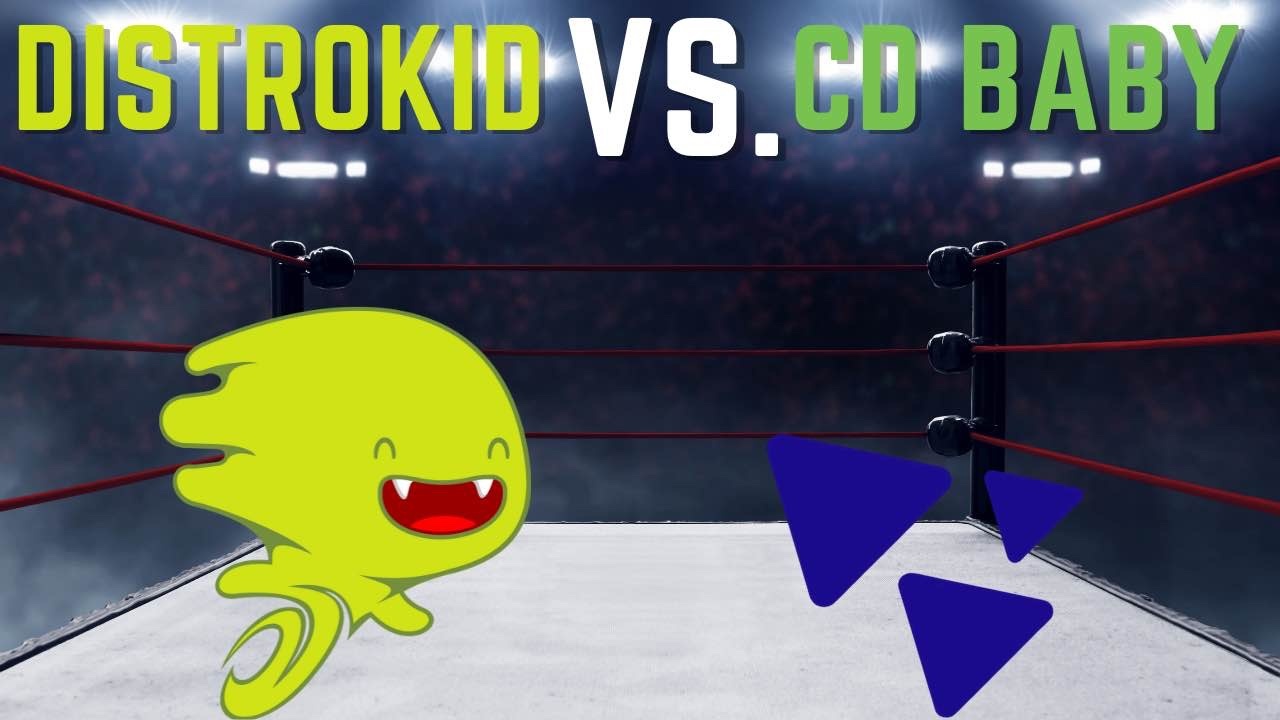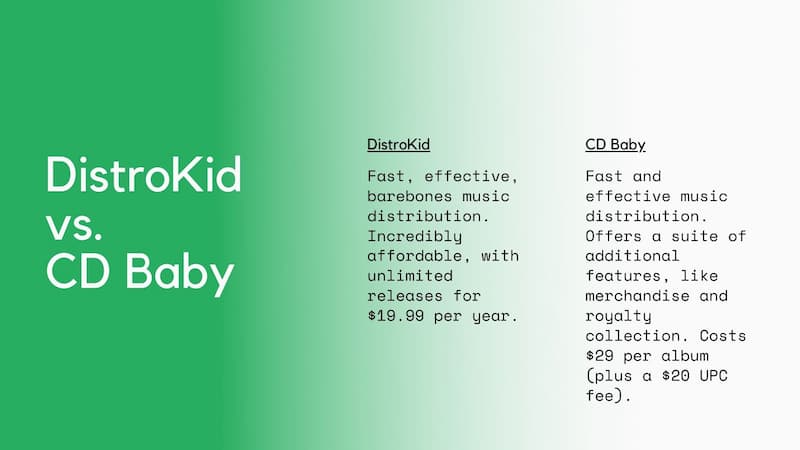Distrokid vs. CD Baby

If you’re an independent musician releasing music for the first time, then you’ve probably come across the names CD Baby and DistroKid several times.
Deciding which of these services to choose for releasing your music can be quite overwhelming. While both of them serve the same purpose of distributing your music to streaming services and online stores, they each have unique features that set them apart.
Let’s dive in and discuss the differences between these two services so you can feel more confident in your decision between CD Baby or Distrokid.
I've personally released albums using both distributors (here's an example with CD Baby and here's an album with DistroKid), and would recommend each of them! It just depends on which is a better fit for your needs.
Note: This article may contain affiliate links, meaning I would receive a commission - at no cost to you - for any products you purchase.
What A Music Distributor Does
A music distributor simply makes your music available to the public through a system of distribution deals with platforms, record stores, and streaming services. They develop payments and contracts to help artists sell their music while taking a cut for their distribution services.
Click here to learn the 11 simple steps to releasing your next album, covering everything from distribution to album art to playlists.
DistroKid Vs. CD Baby Pricing
With DistroKid, you pay an annual fee, which allows you to release as much music as you want. There are three membership plans, including Musician, Musician Plus, and Label. The pricing is $22.99 per year to upload unlimited songs & albums.
I recommend going with Musician Plus, as it offers more features than the cheapest plan.

Note: this image is no longer accurate (2/21/24)
On the other hand, CD Baby charges per release. The pricing is as follows: $9.99 for one album or single.
With CD Baby, you must also separately purchase a separate UPC code (if you don't already have one - and you probably don't) which costs another $20. DistroKid includes the UPC cost in its annual fee.
Of course, there are additional fees that exist on each of these websites as well, though, at a baseline, Distrokid is the cheaper option.
Differences Between DistroKid and CD Baby
The fundamentals of both Distrokid and CD Baby are the same - they'll both do a great job of getting your music on to major streaming platforms. That said, the biggest differences with CD Baby vs. DistroKid are the pricing model and some additional features. DistroKid offers slightly more barebones features than CD Baby, but still plenty to get your music out there!
DistroKid Features
DistroKid distributes one-third of the music released onto the digital market today. So yea, kind of a big deal.
The platform is known for its affordable annual fees, its community-driven promotional tools, its helpful artist development tools, and the fact that artists retain 100% of reproduction royalties.
While the Musician plan is very limited, the Musician Plus plan offers everything an artist might need to successfully release music, expand their reach, and keep track of their stats, including:
- Customizable Label Name
- Customizable iTunes Pricing
- Customizable Pre-Order Date
- Customizable Release Date
- Synced Instagram Lyrics
- Unlimited Song Uploads
It should be noted that DistroKid only collects reproduction royalties, which are those generated by masters (click here to learn all about the different types of royalties).
You can find a wide range of helpful artist development tools on the platform as well, including an array of customizable video templates for social media and a unique Twitch affiliate program.
I love the fact that you can create Hyperfollow links through DistroKid, which allows fans to click once and follow you on Spotify, saving your music to their library with ease.
Here's an example of how you DistroKid automatically creates a Hyperfollow link for you.
Benefits of DistroKid over CD Baby
It’s worth noting that DistroKid does not have restrictions when it comes to file types. You can upload WAV, M4A, WMA, FLAC, CDDA, and MP3, which is much more flexible than CD Baby, which is limited to WAV, MP3, and FLAC files. Plus, DistroKid can accept up to 24-bit WAV files with a sample rate of 96kHz or lower. CD Baby, on the other hand, only accepts 16-bit, 44.1 kHz files.
Unlike CD Baby, DistroKid does not review releases before sending them out to distribution partners. Essentially, you can upload your music and have it sent out to partners immediately. Of course, if you don’t like the idea of potentially dealing with copyright issues or file requirement problems, this lack of quality control can be a bit frightening.
However, if you can’t afford to wait a few weeks for your song to go through the review process, this expediency can be extremely helpful.
CD Baby Features
CD Baby has a number of features that differentiate it from DistroKid.
For starters, the platform’s Leave A Legacy tool ensures that music stays up forever. You never have to worry about your music getting taken down from streaming services, no matter how long you have it up for.
While CD Baby Standard is limited in many ways, CD Baby Pro gives you access to a number of extremely helpful tools, including:
- Mechanical Royalty Collection
- Publishing Royalty Collection
- Song Registration 100+ Countries
- PRO Affiliation
- CD/Vinyl Distribution
- Free Marketing Tools
- Sync Licensing
- YouTube, Facebook, and Instagram Monetization
- Global Music Distribution
The platform is very easy to navigate and comes with a variety of helpful promotional tools to help you design your artist pages via your CD Baby account.
CD Baby provides access to mastering tools as well, which is extremely important in crafting a professional-sounding song. CloudBounce uses a mastering algorithm that costs $9.95 to master your track. However, you can also send your song to a professional mastering engineer via SoundLab, which costs $49 per track and delivers far better results.
Other Benefits of CD Baby over DistroKid
It is also worth mentioning that CD Baby is great for those who want to create physical albums and merch. From vinyl records to CDs to t-shirts and beyond, you can connect with manufacturers via CD baby to get the physical goods you’re looking for.
Once your music is out, CD Baby provides an in-depth data and analytics section so you can get a better idea of your unique listeners and demographics.
What Other People Think About CD Baby Vs. DistroKid
Don't just take my word for it, though! Here's what other folks think about the pros and cons of CD Baby versus DistroKid.
Reviews Of CD Baby:
"CD Baby has always been so good to me, from the very beginning of my career. They truly helped me sustain my independent status."
"CD Baby makes it super easy to drop a worldwide release on your own schedule. The user interface is simple, and the terms are great.”
Reviews Of DistroKid:
“Distrokid is simply amazing! The interface is very easy to use and has all the features that are necessary to get your album on all the popular streaming services.”
“DistroKid might not look the best. However, it is quick and so popular, ending up being the top circulation service. With its extra functions, low rate, and lightning-fast circulation, DistroKid is an excellent, reputable, reliable, and quick platform.”
Is CD Baby Better Than DistroKid?
If you’re more intent on making frequent releases and forming connections with other artists, I HIGHLY recommend signing up for DistroKid. With the ability to release many singles quickly without having to pay a ton of money, you have a higher likelihood of reaching more artists and getting signed to a label.
And frankly, I think the modern music industry is much more receptive to artists frequently putting out shorter albums and singles, instead of one full album every couple of years.
On the other hand, if your goals include expanding your reach and connecting with more fans, CD Baby has a number of unique tools you can use to do so! Plus, with their Leave A Legacy tool, you don’t ever have to worry about your music getting taken down! This is especially helpful if you don't expect your music to be commercially successful, but you still want to share it with the world.
Other Options Besides CD Baby
Of course, CD Baby isn't the only dog in town. There are quite a few music distributors out there. If you're still not convinced about the advantages of DistroKid over CD Baby, check out this comparison of Distrokid vs. TuneCore.
FAQ About DistroKid & CD Baby
Can You Use DistroKid and CD Baby?
You can use both of these services for releasing music, though you shouldn’t release the same music with both services.
And I have!
Based on the tools that each of these services offers, you may consider releasing some of your music through CD Baby and some of it through DistroKid.
Is CD Baby Legit?
CD Baby is one of the biggest names in online music distribution and is an absolutely legitimate service with several high-quality tools for distributing music to online platforms, expanding artist reach to new fans, and building a music career.
From a Frustrated Producer in a Ragtag Bedroom Studio to Major Placements on TV Earning $1,000s!
My name is Evan, and I've been making music since around 3rd grade. I'm from San Diego, California, but I've lived in Washington, DC for the last 20 years.
While I still have a full-time day job, I have created systems that have allowed me to produce dozens of songs a year in my spare time.
My songs have been on Netflix, TV shows like the 90 Day Fiance, an award-winning indie film, and NPR’s “All Thing Considered.” They've also been streamed millions of times.
In addition to being a music producer, I am passionate about teaching people how they can make professional-sounding music and earn money licensing it, all in their spare time.
Thousands of musicians, like yourself, have trusted me to guide their musical journey. My YouTube videos have been watched nearly a million times. And my story has been in Forbes, Side Hustle Nation, and the Side Hustle School.





